- Clone
- 7B11 (See other available formats)
- Regulatory Status
- RUO
- Other Names
- Garpin, Glycoprotein A repetitions predominant
- Isotype
- Mouse IgG2b, κ
- Ave. Rating
- Submit a Review
- Product Citations
- publications
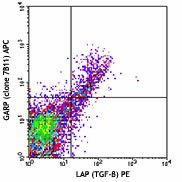
-

Human peripheral blood mononuclear cells were stimulated with CD3 (UCHT1), CD28 (CD28.2), and recombinant human IL-2 for 24 hours; and then stained with CD4 PerCP, LAP (TGF-β) PE and GARP (7B11) APC (top) or mouse IgG2b, κ APC isotype control (bottom). Data was analyzed by gating on CD4-positive cells. -

| Cat # | Size | Price | Quantity Check Availability | Save | ||
|---|---|---|---|---|---|---|
| 352505 | 25 tests | 161 CHF | ||||
| 352506 | 100 tests | 360 CHF | ||||
Glycoprotein A Repetitions Predominant (GARP), also known as leucine rich repeat containing 32 (LRC32), is a 80 kD type I membrane glycoprotein with 20 leucine rich repeats in the extracellular portion of the protein. GARP was found on the surface of megakaryocytes, platelets, and activated Tregs (CD4+, CD25+, FoxP3+ cells) and serves as a receptor for latent TGF-β. Recent evidence suggests that GARP may play a role in controlling suppressor function of Tregs. A mutation in GARP has been reported in a large Samaritan kindred with Usher syndrome type 1, an autosomal recessive disease characterized by profound congenital sensorineural deafness, vestibular dysfunction, and progressive visual loss. In addition, it has been found that GARP mRNA is highly amplified in different tumors, which indicates that tumor cells may use GARP to express TGF-β or to capture TGF-β from their surroundings, resulting in local suppression of anti-tumor immune responses or the induction of Tregs.
Product DetailsProduct Details
- Verified Reactivity
- Human
- Antibody Type
- Monoclonal
- Host Species
- Mouse
- Immunogen
- LRRC32-DNA vaccination
- Formulation
- Phosphate-buffered solution, pH 7.2, containing 0.09% sodium azide and BSA (origin USA)
- Preparation
- The antibody was purified by affinity chromatography and conjugated with APC under optimal conditions.
- Concentration
- Lot-specific (to obtain lot-specific concentration and expiration, please enter the lot number in our Certificate of Analysis online tool.)
- Storage & Handling
- The antibody solution should be stored undiluted between 2°C and 8°C, and protected from prolonged exposure to light. Do not freeze.
- Application
-
FC - Quality tested
- Recommended Usage
-
Each lot of this antibody is quality control tested by immunofluorescent staining with flow cytometric analysis. For flow cytometric staining, the suggested use of this reagent is 5 µl per million cells in 100 µl staining volume or 5 µl per 100 µl of whole blood.
- Excitation Laser
-
Red Laser (633 nm)
- Product Citations
-
- RRID
-
AB_10896059 (BioLegend Cat. No. 352505)
AB_10897808 (BioLegend Cat. No. 352506)
Antigen Details
- Structure
- 80 kD transmembrane GARP glycoprotein with an extracellular region containing 20 leucine-rich repeats
- Distribution
-
Activated Tregs, megakaryocytes, platelets
- Ligand/Receptor
- LAP (TGF-β1)
- Cell Type
- Megakaryocytes, Platelets, Tregs
- Biology Area
- Cell Biology, Immunology, Signal Transduction
- Antigen References
-
1. Ollendorff V, et al. 1994. Cell. Growth Differ. 5:213.
2. Stockis J, et al. 2009. Eur. J. Immunol. 39:3315.
3. Wang R, et al. 2009. P. Natl. Acad. Sci. USA 106:13439.
4. Tran DQ, et al. 2009. P. Natl. Acad. Sci. USA 106:13445. - Gene ID
- 2615 View all products for this Gene ID
- UniProt
- View information about GARP on UniProt.org
Related FAQs
Other Formats
View All GARP Reagents Request Custom Conjugation| Description | Clone | Applications |
|---|---|---|
| Purified anti-human GARP (LRRC32) | 7B11 | FC |
| PE anti-human GARP (LRRC32) | 7B11 | FC |
| APC anti-human GARP (LRRC32) | 7B11 | FC |
| PE/Cyanine7 anti-human GARP (LRRC32) | 7B11 | FC |
| Brilliant Violet 421™ anti-human GARP (LRRC32) | 7B11 | FC |
| Biotin anti-human GARP (LRRC32) | 7B11 | FC |
| PerCP/Cyanine5.5 anti-human GARP (LRRC32) | 7B11 | FC |
| TotalSeq™-A0901 anti-human GARP (LRRC32) | 7B11 | PG |
| TotalSeq™-C0901 anti-human GARP (LRRC32) | 7B11 | PG |
| TotalSeq™-B0901 anti-human GARP (LRRC32) Antibody | 7B11 | PG |
| Brilliant Violet 711™ anti-human GARP (LRRC32) | 7B11 | FC |
Customers Also Purchased
Compare Data Across All Formats
This data display is provided for general comparisons between formats.
Your actual data may vary due to variations in samples, target cells, instruments and their settings, staining conditions, and other factors.
If you need assistance with selecting the best format contact our expert technical support team.
-
Purified anti-human GARP (LRRC32)
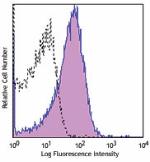
Human platelets were stained with purified GARP (clone 7B11)... -
PE anti-human GARP (LRRC32)
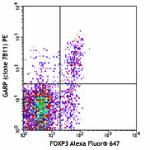
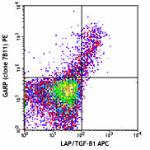
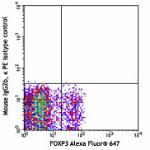
Human peripheral blood mononuclear cells were stimulated wit... -
APC anti-human GARP (LRRC32)
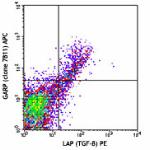
Human peripheral blood mononuclear cells were stimulated wit... 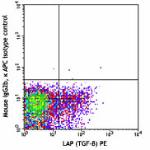
-
PE/Cyanine7 anti-human GARP (LRRC32)

CD3/CD28/IL-2 stimulated (24 hours) human peripheral blood m... -
Brilliant Violet 421™ anti-human GARP (LRRC32)
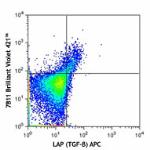
Human peripheral mononuclear blood cells were stimulated wit... 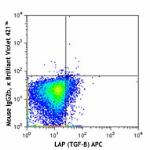
-
Biotin anti-human GARP (LRRC32)

Human peripheral blood mononuclear cells were stimulated wit... -
PerCP/Cyanine5.5 anti-human GARP (LRRC32)

Human peripheral blood mononuclear cells were stimulated wit... -
TotalSeq™-A0901 anti-human GARP (LRRC32)
-
TotalSeq™-C0901 anti-human GARP (LRRC32)
-
TotalSeq™-B0901 anti-human GARP (LRRC32) Antibody
-
Brilliant Violet 711™ anti-human GARP (LRRC32)

Human peripheral blood mononuclear cells were stimulated wit...
 Login / Register
Login / Register 









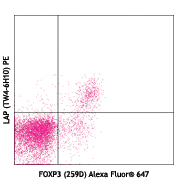
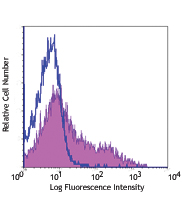
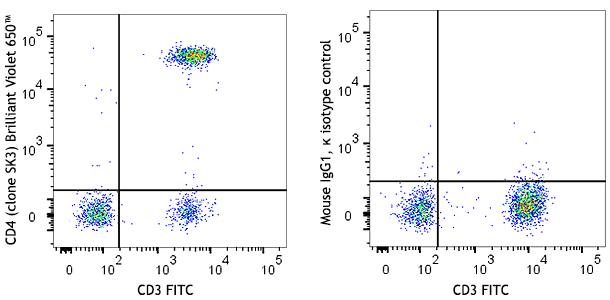
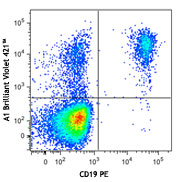



Follow Us